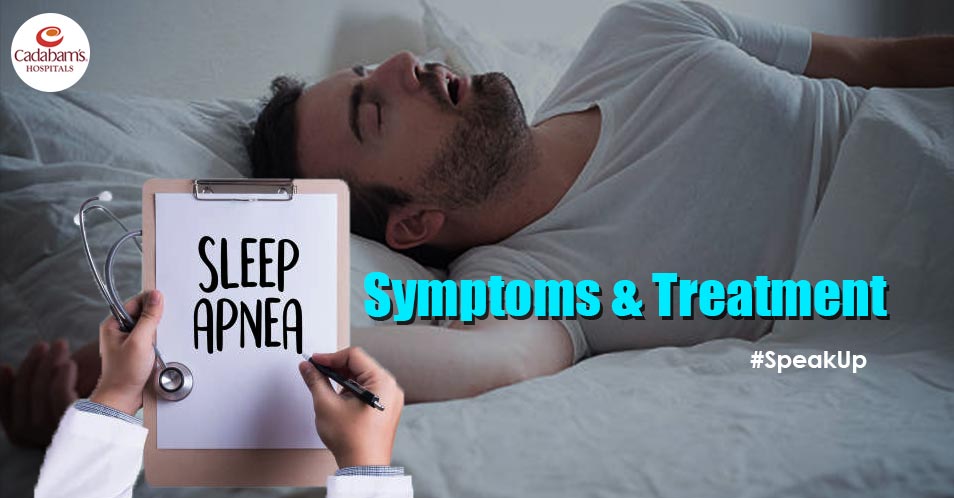Table of Content
Throughout the day, you are mostly on your feet, doing one or the other thing. Your body needs proper rest to rejuvenate and function in an effective manner, and when that does not happen, it can pave the way for many serious health concerns.
Depression, memory loss, acid reflux, mental confusion, adult asthma, etc., are some of the severe effects of sleep apnea. Moreover, it can also impact your day-to-day well-being due to behavioral issues such as moodiness, short temper, decreased concentration, sleep deprivation, or insomnia.
In order to eliminate such side effects of sleep apnea, it is important to get timely treatment from a reckoned medical professional. Cadabam’s Hospitals has been providing effective psychiatric and behavioural health treatment for all kinds of mental health disorders. By combining medication management, psychotherapy, and behavioral techniques, the experts at the center formulate personalized sleep apnea treatments. to ensure that you or your loved one receives the best care plan they deserve. To know more about the sleep apnea treatments at Cadabam’s, book an appointment by calling at +91 97414 76476, +91 7353226622, or email at info@cadabamshospitals.com.
What Is Sleep Apnea?
Sleep apnea is a type of sleep disorder. In simple words, the term "apnea" means cessation of breathing or discontinuance in the process of breathing. It is characterized by pauses in breathing or periods of shallow breathing during sleep. These pauses during sleep can last for a few seconds or for a few minutes, and this can happen many times a night.
Sleep apnea can affect people regardless of sex, race, or age. The usual onset is considered to be 50-60 years. Various statistics show that a significant portion of the adult population, as well as children, have sleep apnea. It affects males about twice as often as females.
What Are The Signs And Symptoms Of Sleep Apnea?
Understanding the signs and symptoms of sleep apnea will help you to get the treatment timely. Following are the sleep apnea symptoms that patients experience –
- Irregular breathing during the sleep
- Loud snoring
- Waking up with a dry mouth
- Gasping for air during sleep
- Irritability
- Lack of attention
- Hypersomnia
- Insomnia
- Morning headache
- Choking
- Excessive daytime sleepiness (EDS)
- Vision problems
Sometimes this may increase chances for driving accidents or work-related accidents. Even death could occur from an untreated disruption in sleep due to lack of oxygen to the body and brain. There are other symptoms like behavioral issues like moodiness, decreased concentration, short temper, insomnia, or sleep deprivation.
What Actually Happens in Sleep Apnea?
The mechanism behind this is when sleep is paused, more carbon dioxide is accumulated in the bloodstream; this, in turn, signals the brain to wake up and breathe.
What Are The Types Of Sleep Apnea?
Following are the types of sleep apnea –
- Obstructive Sleep Apnea – It occurs when the muscles in the back of the throat relax. The muscles support the soft palate, the tonsils, the uvula, the tongue, and the walls of the throat.
- Central Sleep Apnea – In this, the brain is unable to transmit signals to the breathing muscles. So while sleeping, you do not make an effort to breathe for a short time.
- Mixed Sleep Apnea – It is a combination of central and obstructive sleep apnea. Some patients who are being treated for obstructive sleep apnea through a CPAP machine tend to experience symptoms of central sleep apnea.
What Are The Causes of Sleep Apnea?
Some of the causes for Sleep Apnea are overweight, age above 40, neck circumference greater than 40 cm, small jaw bone, sinus problem, drug usage, family history of apnea, smokers affected with high blood pressure, nasal congestion and blockage, allergies, and other medical conditions.
Are There Any Treatments For Sleep Apnea?
Following are the options for sleep apnea treatments –
- Therapies – Various forms of therapies are used to treat sleep apnea, including –
- Continuous Positive Airway Pressure
- The Use of Airway Devices
- Oral Appliances
- Supplemental Oxygen
- Adaptive Servo-Ventilation
- Treatment For Associated Medical Problems
- Surgery – When treatment through surgery does not prove to be effective, doctors prefer surgical options including –
- Tissue Removal
- Tissue Shrinkage
- Jaw Repositioning
- Nerve Stimulation
- Implants
- Tracheostomy
- Lifestyle Changes – Self-care can help in dealing with sleep apnea.
- Exercise
- Losing weight
- Refraining from alcohol
- Quitting smoking
Why Cadabam’s Hospitals?
Comprehensive and holistic treatment provided by Cadabam’s Hospitals has made it one of the well-reckoned medical centers of psychiatric and behavioural health care. Our experienced team instills their expertise in order to design an effective, personalised sleep apnea treatment plan just for you. If you are experiencing sleep apnea symptoms or you know someone who is and needs help, make an appointment with our professionals by calling @+919741476476.
Frequently Asked Questions
Can sleep apnea be cured completely?
Although oral appliances and CPAP work efficiently, they cannot cure sleep apnea. The only definite way to cure sleep apnea is to get surgery or lose weight.
What food can trigger sleep apnea?
Following are the food items that can cause sleep apnea –
- Spicy foods
- Sugary products
- High-fat products
- Alcohol
- Chocolate
Can sleep apnea be cured naturally?
Losing excessive weight can help in clearing the airways and reducing the symptoms of sleep apnea. Maintaining a healthy weight can eliminate the need for surgery.
Does sleeping with your head elevated help sleep apnea?
Sleeping with your head elevated keeps the airways open, thereby allowing consistent breathing. Using a recliner or adjustable bed helps in improving the symptoms of sleep apnea.
How Cadabam's Help you for Addiction?
- 410+ Professional Consultants
- 1,00,00+ Happy Faces
- 120+ Currently Seeking Treatments









